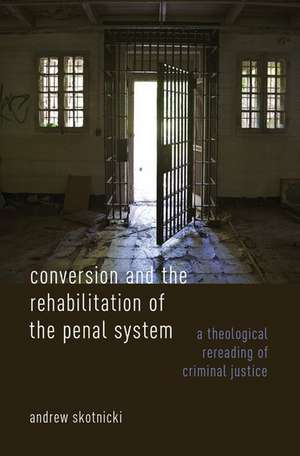Conversion and the Rehabilitation of the Penal System: A Theological Rereading of Criminal Justice
Autor Andrew Skotnickien Limba Engleză Hardback – 30 mai 2019
Preț: 173.62 lei
Preț vechi: 188.85 lei
-8% Nou
Puncte Express: 260
Preț estimativ în valută:
33.24€ • 34.18$ • 27.57£
33.24€ • 34.18$ • 27.57£
Carte tipărită la comandă
Livrare economică 08-14 februarie
Preluare comenzi: 021 569.72.76
Specificații
ISBN-13: 9780190880835
ISBN-10: 019088083X
Pagini: 200
Dimensiuni: 239 x 155 x 23 mm
Greutate: 0.41 kg
Editura: Oxford University Press
Colecția OUP USA
Locul publicării:New York, United States
ISBN-10: 019088083X
Pagini: 200
Dimensiuni: 239 x 155 x 23 mm
Greutate: 0.41 kg
Editura: Oxford University Press
Colecția OUP USA
Locul publicării:New York, United States
Recenzii
For all those people who are tired of the traditional debates about 'the purpose of punishment,' Andrew Skotnicki offers an analysis that is as unique as it is thought-provoking. His view of the current dilemma, one that many would agree with, culminates in a conclusion that is both surprising and compelling.
As a plea for a non-violent penology, Andrew Skotnicki's book is nothing less than an attempt to get Americans to stop talking about crime and how to punish it and to focus instead on harm and how we might help people to heal. It is a timely, vitally necessary, and potentially ground-shifting book.
Skotnicki's splendid new book offers us an incisive critique of the criminality of our current criminal justice system. Erudite, yet eminently readable, Conversion and Rehabilitation of the Penal System presents a cogent case against both retributive and deterrent rationales for detention. Looking ahead to a systemic rehabilitation of our carceral regime, Skotnicki looks back to the original legitimation of incarceration-conversion and restoration to moral community.
As a plea for a non-violent penology, Andrew Skotnicki's book is nothing less than an attempt to get Americans to stop talking about crime and how to punish it and to focus instead on harm and how we might help people to heal. It is a timely, vitally necessary, and potentially ground-shifting book.
Skotnicki's splendid new book offers us an incisive critique of the criminality of our current criminal justice system. Erudite, yet eminently readable, Conversion and Rehabilitation of the Penal System presents a cogent case against both retributive and deterrent rationales for detention. Looking ahead to a systemic rehabilitation of our carceral regime, Skotnicki looks back to the original legitimation of incarceration-conversion and restoration to moral community.
Notă biografică
Andrew Skotnicki teaches theological and criminological ethics at Manhattan College in New York City. He has published widely on the theological and ethical implications of criminal justice. He is the founder and director of the E3MC program (Engaging, Educating, Empowering Means Change), a partnership between Manhattan College and the New York City Department of Corrections.
